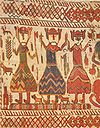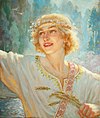Blostlandic Paganism: Difference between revisions
Jump to navigation
Jump to search
No edit summary |
No edit summary |
||
| Line 22: | Line 22: | ||
|- | |- | ||
!scope="row" | '''[[Vanǫ́garðr]]''' | !scope="row" | '''[[Vanǫ́garðr]]''' | ||
| [[File: | | [[File:Asgard and Bifrost in interpretation of Otto Schenk in Wagner's Das Rheingold.jpg|center|100px]] | ||
|The home of the Gods. | |The home of the Gods. | ||
|- | |- | ||
Revision as of 14:29, 26 June 2023
This article is incomplete because it is pending further input from participants, or it is a work-in-progress by one author. Please comment on this article's talk page to share your input, comments and questions. Note: To contribute to this article, you may need to seek help from the author(s) of this page. |
Blostlandic Paganism, or North Sea Paganism (Blostlandic: Vanǫ́trú: "Belief in the Gods"), is a branch of old Weranic Paganism that arose during the times of the ancient Blostlandic and North Sea peoples in the area of the modern day North Euclean Archipelago in Kylaris. It was previously the dominant religion on the Island of Nordavia before Blostlandic Sotirianitization began in 500 AD.
A polytheistic faith with two chief deities and many lower deities .
Common Features
Terms
| Name | Image | Details |
|---|---|---|
| Vanǫ́ss | The Gods of the faith. | |
| Vanǫ́garðr | The home of the Gods. | |
| Himnarvangr | The afterlife. |
Deities
| Name | Image | Other names | Details |
|---|---|---|---|
| Friðill | The Lover | Friðill is the Goddess of Fertility, the Sky/Space, and Love. | |
| Elskr | The Beloved | Elskr is the God of Harvest, the Earth, and Family. | |
| Valfǫðr | Father of the Slain | Dazhbog is the God of the dead, second son of Friðill, and brings the dead to the afterlife where he cares over them. | |
| Yggr | The Terrible One | Yggr is the God of War, third son of Friðill, started the Human-Vættir War; the cause of all wars in human history. |





